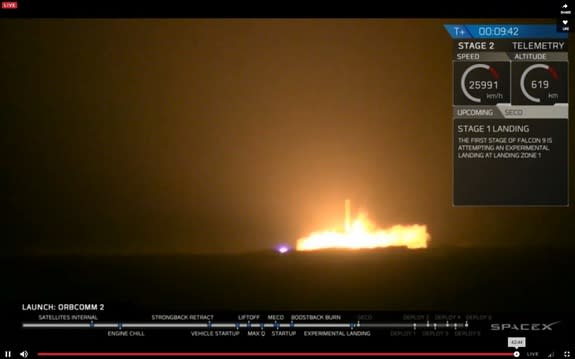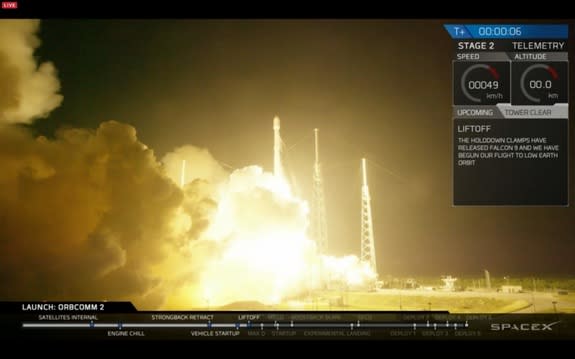Wow! SpaceX Lands Orbital Rocket Successfully in Historic First
The third attempt at a historic reusable-rocket milestone was the charm for SpaceX.
The private spaceflight company brought the first stage of its Falcon 9 rocket back to Earth for a soft touchdown tonight (Dec. 21), pulling off history's first-ever rocket landing during an orbital launch. (Blue Origin, the company led by Amazon.com founder Jeff Bezos, landed its New Shepard booster successfully last month, but that occurred during a suborbital test.)
The Falcon 9 blasted off at 8:29 p.m. EST today (0129 GMT on Dec. 22) from Florida's Cape Canaveral Air Force Station, tasked with delivering to orbit 11 spacecraft for the satellite-communications company Orbcomm. The two-stage Falcon 9 separated, and then the rocket's first stage performed a series three "boostback burns," coming down for a pinpoint touchdown at Cape Canaveral. [How Reusable Rocket Launch Systems Work (Infographic)]
SpaceX's mission control in Hawthorne, California, erupted in raucous cheers when the first stage came into view of a camera near the landing site — then went even more nuts as the booster stage slowed and touched down successfully at SpaceX's "Landing Zone 1," a facility previously used by the Air Force for rocket and missile testing.
SpaceX had tried to land Falcon 9 first stages twice before, both times on an uncrewed "drone ship" hundreds of miles offshore in the Atlantic Ocean. On each occasion — once in January 2015, and then again in April — the booster stage hit its target but came in a little too hard and crashed on the ship's deck.
Today's landing was a milestone moment for SpaceX, which aims to develop fully and rapidly reusable rockets as a way to open the heavens to exploration. Such technology could slash the cost of spaceflight by a factor of 100, potentially making Mars colonies economically feasible, SpaceX founder and CEO Elon Musk has said.
Mars settlement is no idle dream for Musk; he established SpaceX back in 2002 primarily because he wants to help humanity become a multiplanetary species, Musk has repeatedly said.
Today's launch was the first for SpaceX since June 28, when a Falcon 9 broke apart less than three minutes after blasting off from Cape Canaveral, scuttling the seventh uncrewed cargo mission the company is flying to the International Space Station for NASA. (SpaceX holds a $1.6 billion deal to make at least 12 such flights with the Falcon 9 and its robotic Dragon capsule.)
The June failure was likely caused by a faulty steel strut in the Falcon 9 upper stage. Musk has said that, going forward, the company will test every one of the hundreds of such struts that go into each Falcon 9.
SpaceX has also been revamping the Falcon 9 since the accident, adjusting its stage-separation system and electronics, among other features, Musk said.
"I think it's a significantly improved rocket from the last one," he said on Dec. 15 during a talk at the annual winter meeting of the American Geophysical Union in San Francisco.
Today's launch was originally scheduled for Sunday night (Dec. 20), but analyses showed that lifting off tonight provided a 10 percent better chance of landing success, Musk said.
The 11 satellites that launched aboard the Falcon 9 all deployed successfully, and will complete a 17-spacecraft Orbcomm network in low-Earth orbit.
Follow Mike Wall on Twitter @michaeldwall and Google+. Follow us @Spacedotcom, Facebook or Google+. Originally published on Space.com.
SpaceX's Quest For Rocketry's Holy Grail - Space.com Exclusive Video
Blue Origin Blasts Vehicle Into Space and Nails Landing | Video
Copyright 2015 SPACE.com, a Purch company. All rights reserved. This material may not be published, broadcast, rewritten or redistributed.


